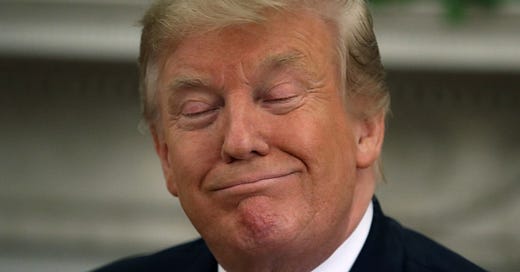If Only We Could Be Surprised That Trump Is Retweeting Epstein Conspiracy Theories
Pizzagate. Wealthy Jewish families controlling the weather. QAnon. Seth Rich's murder. In our current moment of rampant political paranoia and institutional suspicion, conspiracy theories have become as outrageous as they are easy to debunk. We’ve grown adept at poking holes in these theories, analyzing how and why they spread, and explaining how, in reality, things work the way they do in politics and the economy generally for pretty dumb and quotidian reasons.
But then along comes the suicide of Jeffrey Epstein, a story seemingly plucked from the depths of some internet fever swamp: a millionaire financier jet-setting around the globe with elite friends and the underage girls he’d brought along to abuse for their and his own amusement. He dodged serious consequences for those actions a decade ago, thanks to a sweetheart plea deal, but justice seemed near in July when Epstein was indicted for federal sex crimes. Rich and powerful heads seemed sure to roll. And so when Epstein turned up dead in his cell this week, apparently of suicide—well, let’s just say Occam’s razor didn’t feel quite as sharp a conspiracy-puncturing tool as usual.
It isn’t sufficient to simply scoff off anyone who suggests that foul play could plausibly lurk beneath the surface in such a remarkable event as Epstein’s death. Instead, we must treat the plausibility of foul play—something a reasonable observer, seeing the facts as we know them so far, wouldn’t dismiss out of hand—as a given of the case. We must then focus our attention on who is using that plausibility to seek out the truth, and who is using it to sow confusion and distrust for perverse personal gain.
By way of illustration, consider the reactions to the news of Epstein’s death from three prominent Republicans: Senator Ben Sasse, Attorney General William Barr, and President Donald Trump.
In a statement released the day of Epstein’s death, Barr said he was “appalled” by the news of Epstein’s “apparent suicide” and that “Mr. Epstein’s death raises serious questions that must be answered.” The same day, Sasse’s office released a scathing letter addressed to Barr himself, calling for an exhaustive investigation into how his death could have been allowed to occur. “The Department of Justice failed, and today Jeffrey Epstein’s co-conspirators think they might have gotten one last sweetheart deal,” Sasse wrote. “Given Epstein’s previous attempted suicide, he should have been locked in a padded room under unbroken, 24/7, constant surveillance. Obviously, heads must roll.” Sasse went on to list off a number of questions to which the American people deserved answers, including whether the Department of Justice would investigate “the Bureau of Prison’s mismanagement of the incarceration of Epstein” and “any possible criminal activity surrounding this mismanagement.”
Neither Sasse’s nor Barr’s response to the Epstein news is designed to fan the flames of baseless speculation. But they suggest that the two men have reached a similar conclusion about the story: Something about it stinks, and the federal government had better make damn sure it figures out what. Not to do so would be a failure of responsibility not only to Epstein’s victims, but also to the American people, who rely on their government to mete out justice capably, and understandably lose trust in that government when it cannot.
Donald Trump—who, it is worth noting, is president of the United States—took a somewhat different approach. As far as Trump’s concerned, there’s no need for a bunch of furrowed-brow investigations into Epstein’s death: It’s obvious to anyone with a brain that the Clintons had him murdered.
On Sunday, President Trump retweeted a video from far-right Twitter dweller Terrence Williams:

To save you a click and starve him of an ill-gotten nickel, here’s the representative bit of Willliams’s ramble:
“The man ended up dead, and you know what? He had information on the Clintons. And the man ended up dead! Now, for some odd reason—for some odd reason—people that have information on the Clintons end up dead. And they usually die from suicide. Come on now. Now how do everybody die from suicide that got information on you? You know what, to be honest on you, I don’t want to know nothing on the Clintons. ... Don’t tell me nothing. I don’t want to end up dead. … I’m not gonna say who killed that man, because you know I could end up dead, but the word around the street is the Clintons did it.”
The world, as Donald Trump sees it, is simple. Whatever happens, the correct explanation for it is not which explanation is likeliest or most supported by the evidence, but whichever one is best for him or worse for his enemies. This outlook is helpful for a few things: sowing national chaos and confusion, whipping up his supporters, demoralizing his enemies. Perhaps if you asked him, Trump could name yet more benefits.
You know what that outlook’s bad for, though? Actually getting to the bottom of what happened to Epstein, and ensuring such an egregious miscarriage of justice never happens again. Unlike Barr and Sasse, Trump hasn’t bothered to call for an investigation. After all, why look into what everybody already knows?





